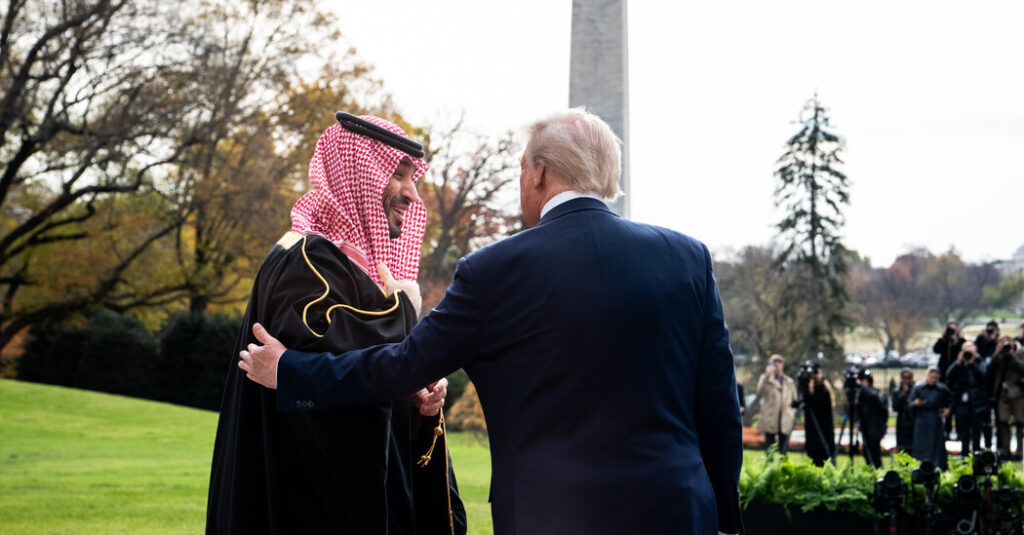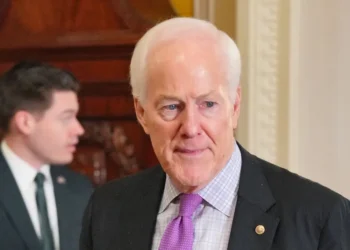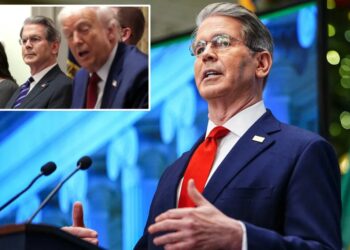The visit by the crown prince of Saudi Arabia to Washington this week painted a familiar tableau: the head of an oil-rich nation cozying up to President Trump and titans of American industry.
That appearance of wealth is core to Saudi Arabia’s power and image in the United States and at home, where the Saudi government has vowed no less than an economic transformation for its young populace. In the Oval Office on Tuesday, Crown Prince Mohammed bin Salman told reporters, without providing details, that his nation would invest $1 trillion in America.
But a different reality is being whispered about in the power corridors of Riyadh and Wall Street: The kingdom’s vaunted Public Investment Fund, which Saudi Arabia has typically used to fulfill commitments like the one it made this week in Washington, is running low on cash for new investments.
That’s in large part because Prince Mohammed and his deputies have spent a vast portion of the nation’s bounty on projects that are in financial distress, and they are frantically trying to turn things around, according to 11 people briefed on its operations, including current employees, board members, investors and their representatives.
There is Neom, a massive would-be utopian region on the nation’s northern tip that was to feature robot workers, a ski resort and beaches of crushed marble but has instead confronted mountains of delays.
Then there are other, more conventional projects in the ever-expanding PIF portfolio that are nowhere near fruition, such as a coffee chain with one shop so far and dreams of exporting beans to Austria; a cruise line with one ship; and an electric vehicle start-up begun three years ago that has yet to deliver a car.
The kingdom still sits on deep oil wealth. Its ability to pump, however, is heavily constricted by geopolitical agreements to curtail supply and a low price for crude overall. The government is running a growing budget deficit and taking on debt to fulfill Prince Mohammed’s domestic promises.
While PIF says it holds nearly $1 trillion in assets, a huge portion of its portfolio is tied up in hard-to-sell assets for which no public valuations are available. Its representatives have begun telling international investors it is all but unable to allocate any more money for the foreseeable future, six people with knowledge of those discussions said.
Unlike some other comparable sovereign wealth funds, PIF posts only a page and a half of annual financial figures.
A spokesman for the fund, Marwan Bakrali, said it has $60 billion in cash and similar financial instruments. He described it as “very liquid by regional standards.”
Behind the scenes, PIF is actively restructuring its operations under the watchful eye of the crown prince, said the people briefed, who spoke on the condition of anonymity to discuss confidential business plans.
The prince has fired the head of at least one of its more imperiled projects, Neom, according to two people briefed on the matter. Meanwhile, the fund is furiously slashing internal financial projections for various investments, including a string of luxury resorts on the Red Sea that sit mostly empty.
Its board is also drawing up plans to act differently in the future by investing in more conventional areas such as publicly traded stocks and bonds, one of the people said. It hopes to double in size to $2 trillion in the next five years, although it’s unclear how much of that would come from investment gains and how much would be new money from the Saudi government.
“As a long-term investor,” Mr. Bakrali said, “our investments will be judged over generations, not quarters, and the returns will be measured both financially and through economic and societal impact.”
In the meantime, PIF’s bigger moves in recent months have been yet more private investments, this time in artificial intelligence companies.
The largest investment by PIF this autumn was bid for a controlling stake in the world’s largest video game maker, Electronic Arts. PIF’s representatives say it’s a long-term investment that will eventually double in value. People close to the fund point to another motivating factor: Prince Mohammed is an avid gamer.
Don’t call it ‘Piff’
The world of sovereign wealth funds can be a staid place. The world’s largest, Norway’s $2 trillion Government Pension Fund Global, invests in publicly traded stocks.
Other countries’ funds look inward, such as India’s, which is barred from investing outside the nation.
For much of its history, PIF was not much different. It was created in 1971, funded by the Saudi government squarely to finance domestic companies such as nationally run banks and electric utilities.
By 2015, it had roughly $100 billion in assets, 50 staff members and zero name recognition. That March, a new Saudi king transferred control of the entity to his third wife’s eldest son, Prince Mohammed, then 29 years old.
And the prince turned PIF into a central tool in his roll-up of power, so much so that PIF now says that was the year it was “reborn.”
Prince Mohammed packed PIF with government cash, took out loans and redirected some of the nation’s oil sales (currently estimated by outsiders at $500 million per day) to the fund. He also transferred in assets that had been seized from political opponents and family members in what was termed an “anti-corruption” effort.
The government has attributed 1.1 million Saudi jobs to PIF projects, though that claim cannot be independently verified.
PIF itself now has more than 3,000 staff members. Its annual report, released in August, indicates that its revenue increased 25 percent in the preceding year.
The expansion has also been huge for Yasir al-Rumayyan, the fund’s governor. A regional banker for most of his career, he said in one podcast interview that Prince Mohammed initially tapped him to find candidates to lead PIF. The royal, Mr. al-Rumayyan said, “wasn’t fully satisfied with the majority” and chose the man searching instead.
He has reveled in the role — showing one visitor a photo of his yacht — and goes so far as to sharply correct those who pronounce the fund’s name “Piff,” as opposed to spelling out the acronym, according to three people who have heard him say so.
Mr. al-Rumayyan attended the Super Bowl last year with Benjamin Horowitz, whose venture-capital firm manages money for PIF, and sat at Mr. Trump’s side last November at the post-election Ultimate Fighting Championship match at Madison Square Garden.
He has taken stakes for Saudi Arabia in American companies like Uber and Citi, and created a global league around his personal hobby, golf. Sports leagues and teams — including big brands like F1 and the English Premier League team Newcastle United — sold stakes to PIF’s funds.
PIF has also made some opportune bets in the public markets, including building a huge portfolio in U.S. stocks amid their pandemic nadir, which proved profitable when prices rebounded.
Mr. al-Rumayyan declined to be interviewed.
Regarding PIF’s restructuring, Ahmed al-Khateeb, a PIF board member and Saudi Arabia’s tourism minister, characterized the moves as natural steps in Prince Mohammed’s broader effort to overhaul the Saudi economy.
“You stop, you assess what went right, what went wrong, and then you improve,” Mr. al-Kateeb said.
Signs of financial distress
A major symbol of the influence of PIF and Mr. al-Rumayyan has been the Future Investment Initiative, dubbed Davos in the Desert, an annual gathering that hosts thousands of people in the nation’s capital.
Historically, among the most sought-after parties coinciding with the event has been a gathering at Mr. al-Rumayyan’s palm-tree-lined villa, formerly owned by a magnate jailed in Prince Mohammed’s infamous 2017 roundup of political opponents.
So when about 100 titans of global finance and industry convened at his villa, there would have seemed little reason to expect anything other than the usual cavalcade of abu al-karavatta, the dismissive term that some locals use to refer to tie-wearing out-of-towners seeking the kingdom’s cash.
As Mr. al-Rumayyan rose to give welcoming remarks in his personal ballroom, with waiters poised to serve lamb and rice, he was greeted by an unusual sight.
An unoccupied seat was marked with a place card for the private-equity billionaire Stephen A. Schwarzman, who had attended every prior annual dinner and whose firm, Blackstone, has made a small fortune off its relationship with the kingdom.
Mr. Schwarzman’s absence was noted by attendees, but he did arrive, hours late (after dessert). His spokeswoman blamed traffic.
Throughout the conference, there was a sense of change, with wistful talk of a headier time for Westerners when it felt like most visiting businesspeople to Riyadh would return home with cash.
This year, PIF’s representatives told asset managers of new conditions for future investments: The only way it would give them more is in exchange for help bailing out its older investments, according to two of the fund’s staff and five investors or their representatives.
In one illustrative deal outlined by a person who was in negotiations for an investment from PIF, the Saudi fund said it would allocate more money only if more than double its investment was funneled back into private Saudi companies.
The upshot would be international money flowing into PIF-owned projects, bolstering their status.
Of reinvesting PIF’s money into private Saudi companies, another PIF spokesman, Rupert Trefgarne, said: “There’s no requirement. There’s certainly an encouragement.”
Even the company that runs the annual conference itself is on the block. Majority owned by PIF, earlier this year it hired a U.S. investment bank to explore options, including selling itself to an outsider for cash, according to two people consulted by Future Investment Fund executives.
No such buyer could be found. PIF now hopes to list shares in the conference organizer on the Saudi Stock Exchange, which it also owns. PIF’s spokesman said that had always been the plan.
Rob Copeland is a finance reporter for The Times, writing about Wall Street and the banking industry.
The post Saudi Arabia’s Prince Has Big Plans, but His Giant Fund Is Low on Cash appeared first on New York Times.




